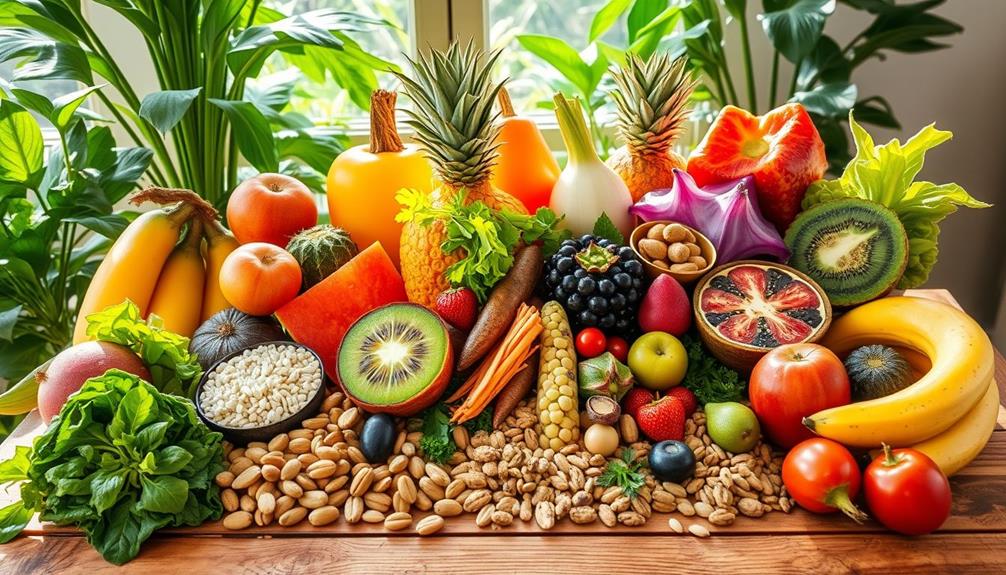Yes, you can live on a raw food diet, but it takes dedication and careful planning. You'll need to focus on consuming fresh, unprocessed foods while ensuring you get essential nutrients. Be aware of potential deficiencies in vitamin B12, protein, and calcium, which might require supplementation. Alongside nutritious benefits like improved skin health and weight loss, you may also face challenges in social situations. Meal prep can be time-consuming, so consider starting with simple recipes. Curious about how to maintain nutritional balance and make this lifestyle work for you? There's more to explore. When considering a raw food diet and meat, it’s important to note that some people choose to include certain raw animal products, such as raw fish or raw eggs, in their diet. However, this can come with an increased risk of foodborne illness, so it’s essential to source high-quality, safe-for-consumption products and handle them with care. Additionally, if you do choose to include raw meat in your diet, it’s crucial to ensure that you’re still meeting your nutritional needs and maintaining a balanced intake of essential nutrients. Consulting with a healthcare professional or nutritionist can provide personalized guidance and support in navigating the challenges and benefits of this dietary choice.
Key Takeaways
- A raw food diet emphasizes fresh, unprocessed foods, typically keeping cooking temperatures below 104-118°F to preserve nutrients.
- Nutritional deficiencies in vitamin B12, protein, and calcium can occur, requiring careful planning and possible supplementation.
- Health benefits include improved skin health, weight loss, and reduced chronic disease risk due to high fiber and nutrient density.
- Meal preparation is time-consuming, and social situations may pose challenges for those adhering to a raw food diet.
- A balanced intake of various fruits, vegetables, nuts, and seeds is essential to prevent health issues and ensure nutrient adequacy.
Understanding the Raw Food Diet
Understanding the Raw Food Diet requires a commitment to fresh, unprocessed foods that can transform your approach to nutrition. This diet emphasizes consuming raw fruits, vegetables, nuts, seeds, and sprouted grains, all while keeping cooking temperatures below 104-118°F (40-48°C) to preserve crucial nutrients and enzymes.
You'll explore various meal preparation methods like juicing, blending, dehydrating, soaking, and sprouting to enhance the nutritional profile of your meals. Incorporating options like celery juice can provide additional health benefits, as it's known for its anti-inflammatory properties and may aid in digestive health.
While the Raw Food Diet can invigorate your energy levels and promote weight loss, you need to be mindful of your nutritional intake. It's important to make sure you're getting enough protein, as well as vitamin B12 and iron, which might be challenging on this diet. Careful planning and potential supplementation can help you avoid deficiencies.
Keep in mind that sticking to this diet can be socially challenging and time-consuming. You'll need to invest significant effort in meal preparation and handling food safely to prevent foodborne illness.
Health Benefits of Raw Foods

When you choose a raw food diet, you're fueling your body with nutrient-dense fruits and vegetables that can boost your overall health.
This approach not only supports heart health but also enhances digestive function, making it easier for you to maintain regularity.
Additionally, a raw food diet can promote weight loss and increase your energy levels, as these natural foods are often low in calories and high in fiber.
Nutrient Density Advantages
The raw food diet offers remarkable nutrient density advantages that can considerably enhance your health. By focusing on raw fruits and vegetables, you're tapping into a treasure trove of essential vitamins, minerals, and antioxidants while keeping calories low. This can help with weight management and overall well-being.
Additionally, the emphasis on whole foods can support effective strategies for weight loss and promote a balanced approach to nutrition. Consider these key benefits:
- Rich in phytonutrients: These plant compounds may lower the risk of chronic diseases such as heart disease and diabetes.
- High fiber content: This supports digestive health and promotes regularity, making it easier to maintain a healthy gut.
- Enhanced metabolic function: Raw foods preserve natural enzymes, aiding digestion and improving nutrient absorption.
Incorporating raw food diets into your lifestyle means you'll enjoy a wealth of nutrients that support not only your physical health but also your skin health.
The antioxidants found in raw foods can lead to clearer complexions and greater overall energy. Embracing this diet can empower you to make positive changes, enabling you to thrive while reducing inflammation and combating chronic diseases effectively.
Digestive Health Improvement
Raw foods do more than just boost nutrient density; they also play a significant role in enhancing digestive health. The high fiber content in raw fruits and vegetables promotes regular bowel movements and can alleviate constipation, supporting your overall digestive health. These unprocessed foods retain natural enzymes that aid digestion, enhancing nutrient absorption and gut health.
Consuming a variety of raw foods helps maintain a healthy gut microbiome, which is linked to improved digestion and immune function. Additionally, a raw food diet can reduce symptoms of digestive disorders like irritable bowel syndrome (IBS) due to its emphasis on whole, easily digestible foods. The increased intake of antioxidants from raw plant foods also helps reduce inflammation in the gut, contributing to better digestive health and overall wellness.
Here's a quick overview of how raw foods enhance digestive health:
| Benefits of Raw Foods | Impact on Digestive Health |
|---|---|
| High fiber content | Promotes regular bowel movements |
| Natural enzymes | Enhances nutrient absorption |
| Supports gut microbiome | Improves digestion and immune function |
| Whole, unprocessed foods | Eases symptoms of digestive disorders |
| Antioxidants | Reduces gut inflammation |
Nutritional Considerations and Risks
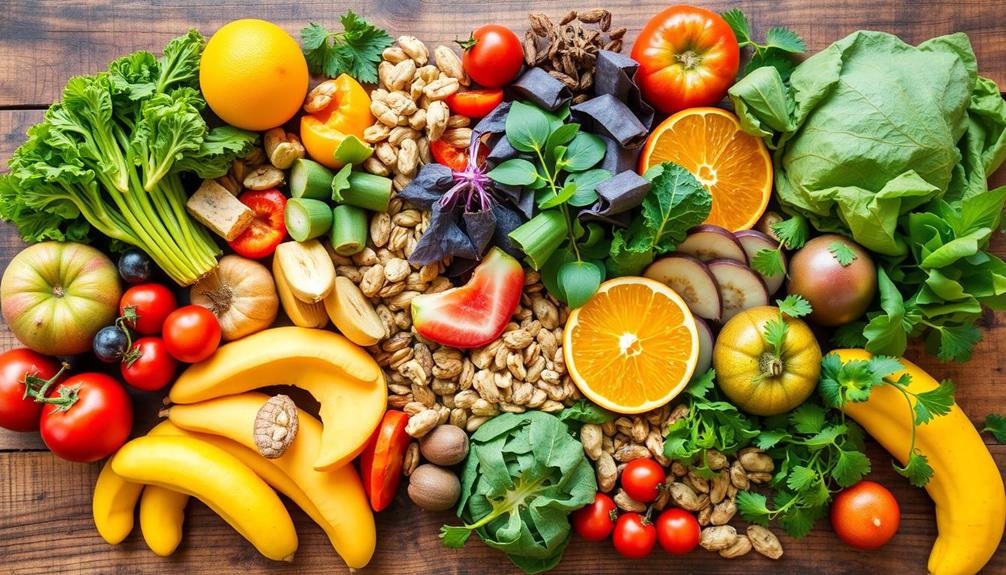
Adopting a raw food diet can pose several nutritional challenges that you should be aware of. While raw fruits and veggies are packed with nutrients, you might face deficiencies in critical elements like:
- Vitamin B12: Essential for nerve function and blood formation, it's hard to get from raw plants.
- Protein intake: Limited sources can lead to energy depletion and loss of lean muscle mass.
- Calcium: Important for bone health, often lacking in a raw diet.
Additionally, cooking enhances nutrient availability, meaning you might miss out on essential antioxidants.
Cold medications overview suggests that the lack of certain nutrients in a raw diet can lead to increased susceptibility to illnesses, making it important to maintain a balanced intake.
Long-term adherence to a raw food diet can also result in dental health issues, as the acidity of many raw foods can erode enamel.
Food safety is another major concern. Raw animal products can harbor harmful bacteria like E. coli and Salmonella, making proper food handling critical.
To mitigate these risks, consider regular dental check-ups and guarantee that you source your food responsibly.
Types of Raw Food Diets
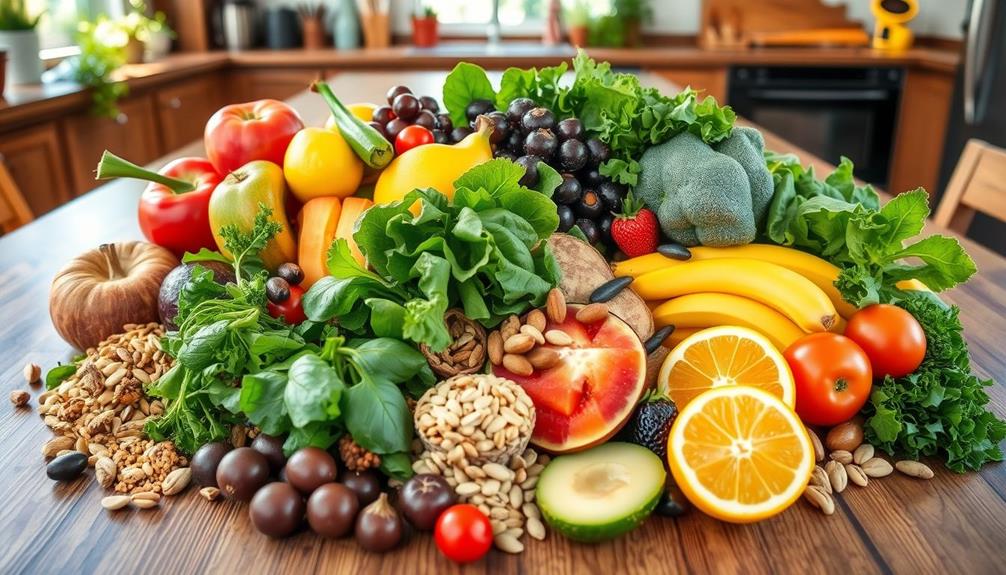
Exploring different types of raw food diets can help you find a plan that aligns with your nutritional needs and lifestyle.
The raw vegan diet focuses solely on plant-based foods, excluding all animal products. You'll enjoy a variety of raw fruits, vegetables, nuts, seeds, and sprouted grains, aiming for at least 75% of your intake to be raw or minimally cooked. Understanding the mechanics of French press coffee, for example, can be a fascinating way to explore how different preparation methods affect your overall health and wellness.
If you're looking for more flexibility, the raw vegetarian diet includes raw eggs and unprocessed dairy, allowing for a broader range of common foods while still emphasizing raw food consumption.
On the other hand, the raw omnivorous diet combines raw plant foods with raw animal products like raw fish and meat, catering to those who want to include animal sources in their diet.
It's crucial to reflect on diet variability; some people may allow for minimal cooked foods, whereas others strictly adhere to a 100% raw foodism approach.
Regardless of the type you choose, common foods across all diets include a diverse range of fruits, vegetables, nuts, seeds, and legumes, complemented by specific preparation methods to guarantee adequate intake and better nutrient absorption.
Food Preparation Techniques

When it comes to a raw food diet, mastering food preparation techniques is essential for maximizing nutrition and flavor. For instance, incorporating essential oils for health benefits into your meals can enhance not only the taste but also provide additional therapeutic properties.
You can elevate your meals and health by incorporating various methods that keep your food fresh and nutrient-rich. Here are three key techniques to take into account:
- Soaking beans and grains to enhance digestibility and nutrient absorption.
- Sprouting grains to increase their nutritional value and add a crunchy texture.
- Dehydrating fruits and vegetables to preserve their flavor and extend shelf life.
Additionally, juicing and blending are popular methods for creating smoothies and juices that combine various raw fruits and vegetables, helping you maximize nutrient intake conveniently.
When preparing your food, remember to keep temperatures below 104-118°F (40-48°C) to preserve natural enzymes and nutrients. Proper food handling and washing techniques are critical, especially for raw sprouts and unpasteurized juices, to minimize the risk of foodborne illnesses.
Sample Meal Plans
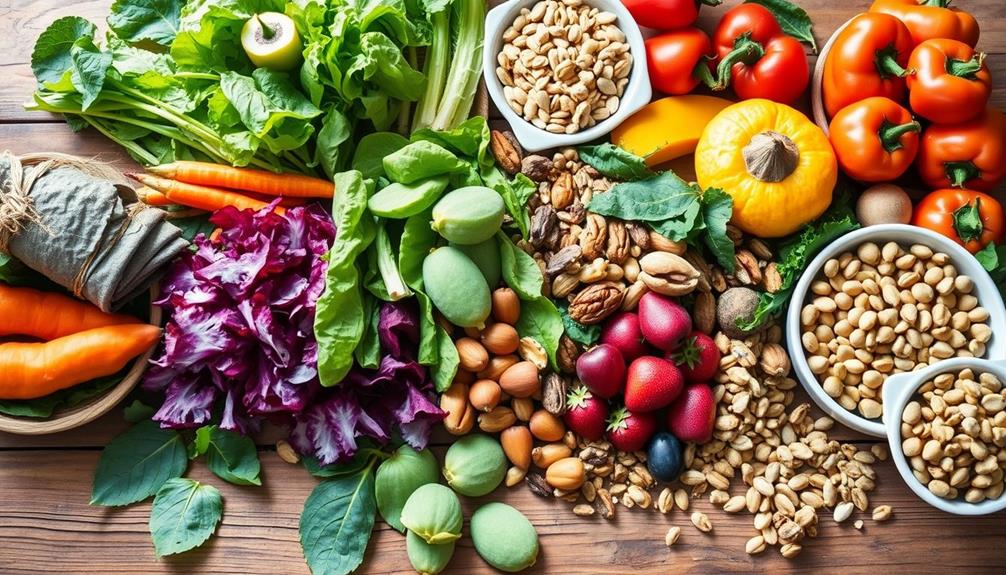
When planning your raw food meals, you'll want to contemplate daily examples that keep your diet balanced and satisfying.
Incorporating nutrient-rich options like smoothies, salads, and zucchini noodles can help meet your nutritional needs, while exploring various coffee varieties can also enhance your energy levels throughout the day, particularly if you enjoy coffee and exercise performance.
Let's explore some sample meal plans to help you get started on this vibrant eating journey.
Daily Meal Examples
Embracing the vibrancy of a raw food diet opens up a world of delicious and nutritious meal possibilities. Incorporating a variety of colorful fruits and vegetables not only enhances the visual appeal of your meals but also provides a broad spectrum of vitamins and minerals essential for your health.
Here are some meal examples to inspire your day:
- Breakfast: Start with a smoothie made from blended fruits and leafy greens for a nutrient-dense boost.
- Lunch: Enjoy a satisfying salad filled with a variety of raw vegetables, nuts, and seeds that'll keep your energy levels up.
- Dinner: Try zucchini noodles topped with a raw tomato sauce, showcasing the versatility of raw ingredients.
For snacks, grab fresh fruits or whip up some homemade raw nut bars for a healthy option. As a delightful dessert, indulge in raw cacao energy balls or a rejuvenating fruit sorbet to satisfy your sweet tooth while sticking to the raw food diet principles.
These meal examples not only provide essential nutrients but also keep your taste buds excited. The combination of fruits, vegetables, and nuts creates a balanced approach to eating raw, ensuring you stay energized and satisfied throughout the day.
Immerse yourself in this nutritious lifestyle, and enjoy every bite! Additionally, you may find that integrating practices like yoga for back pain can complement your healthy eating habits, promoting overall wellness and relaxation.
Nutritional Considerations
A well-planned raw food diet can provide you with fundamental nutrients while keeping your meals exciting and satisfying. To achieve peak nutrient density, aim for at least 75% raw or minimally cooked foods, focusing on fruits, vegetables, nuts, seeds, and sprouted grains. Incorporating a variety of colors and textures not only enhances the visual appeal but also guarantees a broader range of nutrients, which is critical for overall health.
For breakfast, whip up a smoothie with blended fruits and leafy greens. At lunch, enjoy a vibrant salad packed with various raw vegetables and nuts. For dinner, try zucchini noodles topped with a fresh raw tomato sauce.
It's imperative to maintain dietary balance by incorporating sufficient protein sources like nuts and seeds to prevent protein deficiencies. Since raw diets can lack fundamental nutrients, consider the significance of vitamin B12, calcium, and omega-3 fatty acids.
Emphasizing holistic approaches to nutrition is important for long-term sustainability. Planning your meals ahead of time enhances your nutrient intake and overall health. Utilize meal preparation techniques such as soaking and sprouting to improve nutrient availability.
Pros and Cons of Raw Eating
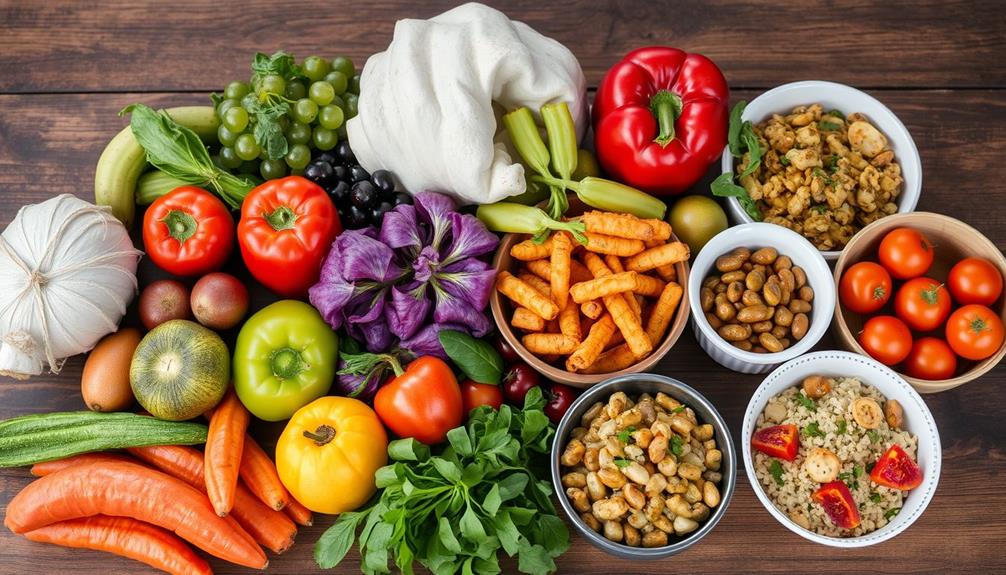
Exploring the raw food diet reveals a mix of enticing benefits and notable drawbacks. Here's what you need to take into account:
- Health benefits: Enjoy improved skin health and reduced risk of chronic diseases. Additionally, a balanced approach to nutrition, incorporating various sources of vitamins and minerals, is essential for maintaining overall wellbeing, similar to the importance of a well-structured budget in financial health.
- Weight loss: Lower calorie intake might help you shed pounds.
- Nutritional deficiencies: Be cautious about missing out on essential nutrients.
While the raw food diet can be a path to better health, it's not without challenges. You may experience nutritional deficiencies, particularly in vitamin B12, protein, iron, and omega-3 fatty acids, which means careful meal planning or supplementation is vital.
Additionally, long-term adherence might lead to digestive issues and menstrual irregularities due to potential caloric insufficiency.
Also, the high acidity in some raw foods can result in tooth erosion, making it important to monitor your choices.
Ultimately, while a raw food diet offers significant health benefits, you'll need to weigh these against the possible drawbacks to make sure it aligns with your lifestyle and nutritional needs.
Social and Lifestyle Challenges

Following a raw food diet can present a range of social and lifestyle challenges that you mightn't anticipate. At social gatherings, you may struggle to find acceptable raw food options, making it hard to enjoy compliant meals with friends and family. This lack of variety can lead to feelings of isolation, especially when others indulge in cooked foods.
Meal preparation for a raw diet is time-consuming and requires significant planning. You'll need to invest in kitchen appliances like blenders and dehydrators, which adds to the complexity of maintaining your lifestyle.
Eating out becomes a challenge, as you'll often need to research specialty stores or restaurants that cater to your dietary needs, and these mightn't be easily accessible in your area.
Additionally, if you're in the process of adapting to a raw food diet, you might experience digestive discomfort as your body adjusts to increased raw fruits and vegetables. This adjustment period can make social settings feel even more challenging.
Balancing your dietary choices with social interactions requires effort, but being aware of these challenges can help you navigate them more effectively.
Tips for Beginners

Starting a raw food diet can feel overwhelming, but you can ease into it by sticking to simple recipes at first. Gradually incorporate more raw foods to help your body adjust and minimize any digestive discomfort. Here are a few tips to get you started:
- Focus on seasonal and local produce to enhance flavor and nutrition.
- Invest in a high-quality blender and food processor; these tools will simplify your meal prep.
- Join online communities or local groups for support and recipe sharing.
Planning your meals ahead of time is vital. This not only minimizes food waste but also guarantees you have a balanced intake of nutrients. A variety of fruits, vegetables, nuts, and seeds is essential to meet your dietary needs.
As you become more comfortable with raw foods, you'll discover endless possibilities for delicious meals. Don't hesitate to experiment with different combinations and flavors! Embrace the process and enjoy the journey toward a healthier lifestyle.
Ensuring Nutritional Balance
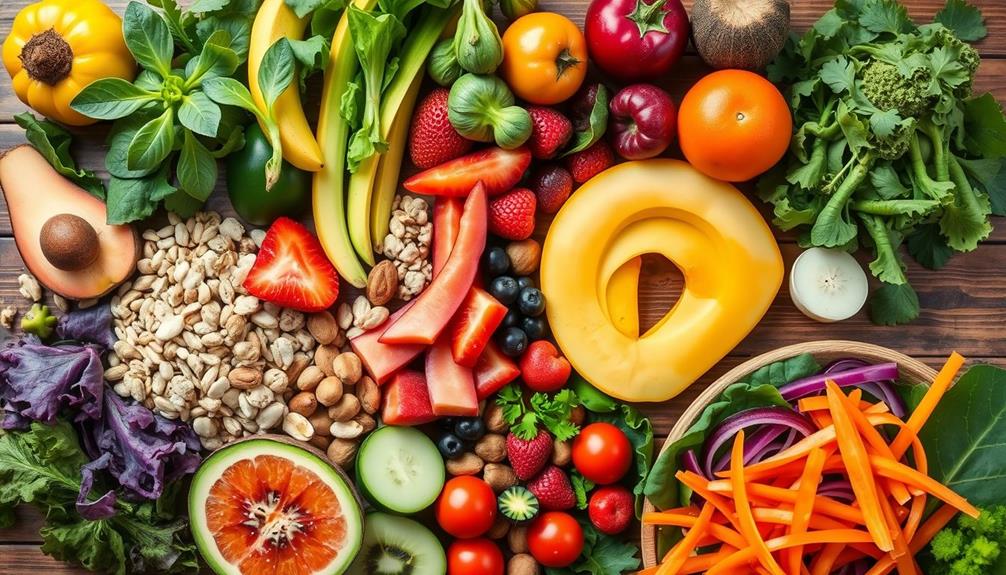
A well-rounded raw food diet requires careful attention to nutritional balance to guarantee you meet your body's needs. It is vital to include a variety of fruits, vegetables, nuts, seeds, and sprouted grains to fulfill your essential nutrient needs. Without proper planning, you risk deficiencies in critical nutrients like vitamin B12, iron, calcium, and omega-3 fatty acids.
Here's a helpful table to visualize key nutrients and their sources:
| Nutrient | Sources |
|---|---|
| Vitamin B12 | Fortified foods, supplements |
| Iron | Spinach, nuts, seeds |
| Calcium | Almonds, leafy greens |
| Omega-3 Fatty Acids | Flaxseeds, walnuts |
| Protein | Nuts, seeds, sprouted grains |
Since a raw food diet can be low in calories, monitoring your caloric intake is important to avoid energy depletion and muscle loss. Aim to have protein intake at least 10% of your daily calories. In some cases, supplementation might be necessary, especially for nutrients like vitamin B12 and vitamin D, which can be difficult to obtain from a strictly raw food approach.
Frequently Asked Questions
What Are the Negatives of the Raw Food Diet?
The raw food diet has negatives like potential nutrient deficiencies, digestive issues, social challenges, and health risks such as lower bone mass and menstrual irregularities. Plus, improper handling of raw foods can lead to serious foodborne illnesses.
What Happens if You Only Eat Raw Food?
Raw food feasting fosters fascinating flavors, but it can also lead to fatigue, digestive disturbances, and dental dilemmas. You might face nutritional deficiencies, energy drops, and menstrual irregularities if you stick strictly to this diet.
What Happens to Your Body on a Raw Food Diet?
On a raw food diet, you'll likely boost your vitamin and fiber intake, improving digestion. However, you might face nutritional deficiencies, digestive discomfort, and dental issues if you don't plan your meals carefully.
What Do Doctors Say About the Raw Food Diet?
Doctors often express concerns about the raw food diet's risks, highlighting potential nutrient deficiencies and digestive issues. They recommend a balanced approach, combining raw and cooked foods to guarantee adequate nutrition and minimize health risks.
Conclusion
In summary, embracing a raw food diet can be a invigorating and rewarding journey, but it's essential to take into account the potential pitfalls. By balancing your choices and seeking diverse, nutritious options, you'll thrive on this vibrant venture. Stay savvy about your nutritional needs, and don't shy away from experimenting with different food preparation techniques. With some preparation and persistence, you can savor the scrumptious simplicity of raw eating while maintaining your health and happiness.

